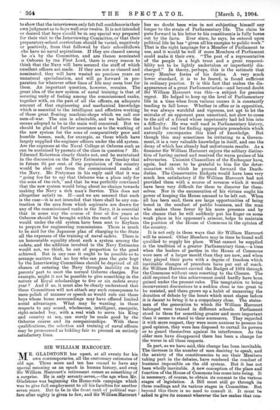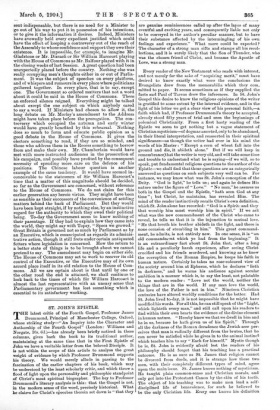SIR 'WILLIAM HARCO1JRT.
mR. GLADSTONE has upset, at all events for his own contemporaries, all the customary estimates of old age. Three score and ten has ceased to have any • special meaning as an epoch in human history, and even Sir William Harcourt's retirement comes as something of a surprise. He is only seventy-seven,—the age when Mr. Gladstone was beginning the Home-rule campaign which was to give full employment to all his faculties for another seven years. But to be in the front rank of political war- fare after eighty is given to few, and Sir WilliamHarcourt has no doubt been wise in not subjecting himself any longer to the strain of Parliamentary life. The claim he puts forward in his letter to his constituents is fully borne out by the facts. Ever since, he says, he entered upon political life he has "given all his energies to public work." That is the right language for a Member of Parliament to use, and it would be well if more Members of Parliament could make it their own. "The post of a representative of the people is a high trust and a great responsi- bility not to be lightly undertaken or imperfectly dis- charged." In theory, perhaps, this is the estimate that every Member forms of his duties. A very much lower standard, it is to be feared, is found sufficient in ordinary practice. It is this fact that makes the dis- appearance of a great Parliamentarian—and beyond doubt Sir William Harcourt was this—a subject for genuine regret. He helped to keep up the level of Parliamentary life in a time when from various causes it is constantly tending to fall lower. Whether in office or in opposition, he was always watchful and vigorous, not apt to let the mistake of an opponent pass unnoticed, not slow to-come to the aid of a friend whose impetuosity had led him into a difficulty. He was well read in Parliamentary history, and had the zeal for finding appropriate precedents which naturally accompanies this kind of knowledge. But though this may sometimes be irritating to a Govern- ment, it is a very valuable knowledge in itself, and one the decay of which has already had unfortunate results. As a financier Sir William Harcourt enjoys the solitary distinc- tion of having earned and received the warm praises of his adversaries. Unionist Chancellors of the Exchequer have, again, had cause to be grateful to him for the deter- mination with which he pressed forward the Death- duties. The Conservative Budgets would have been very much less satisfactory if Sir William Harcourt had not provided them with a source of revenue which it would have been very difficult for them to discover for them- selves. Nor in the enumeration of his virtues ought his power of keeping the House amused to be left out. When all has been said, there are large opportunities of being bored in the conduct of public business, and the man who makes these fewer by his mere presence and by the chance that he will suddenly put his finger on some weak place in his opponent's armour, helps to maintain the position of the House of Commons in the opinion of the country.
It is not only in these ways that Sir William Harcourt will be missed. Other Members may in time be found well qualified to supply his place. What cannot be supplied is the tradition of a greater Parliamentary time,—a time when the leaders of parties in the House of Commons were men of a larger mould than they are now, and when they played their parts with a degree of freedom which inevitable changes of procedure have put out of reach. Sir William Harcourt carried the Budget of 1894 through the Commons without once resorting to the Closure. The skill required for this achievement could hardly have been gained under the present rules. The temptation to bring inconvenient discussions to a sudden close is too great to be resisted, and there grows up a habit of measuring the duration of debate by the hours which must elapse before it is decent to bring it to a compulsory close. The states- men of the generation to which Sir William Harcourt belonged were trained in different schools. Parliament stood to them for something greater and more important than it seems to stand to their successors. They regarded it with more respect, they were more anxious to possess its good opinion, they were less disposed to curtail its powers or to guard themselves against its interference. As the older men have disappeared there has been a change for the worse in all these respects. 11 part, as we have said, this change has been inevitable. The increase in the number of men desiring to speak, and the anxiety of the constituencies to see their Members taking part in the debates, have rendered the conduct of business impossible on the old system. But it has not been wholly inevitable. A new conception of the place and function of the House of Commons has come into being. It is necessary, of course, to obtain its consent to the various stages of legislation. A Bill must still go through its three readings and its various stages in Committee. • But beyond this there is no need to consult it. It must be asked to give its consent wherever the law makes that con- sent indispensable, but there is no need for a Minister to go out of us way to put it in possession of his intentions, or to give it the information it desires. Indeed, Ministers have avowedly held. every expedient justified which could have the effect of keeping a controversy out of the reach of the Assembly to whose confidence and support they owe their existence. It is impossible, for example, to imagine Mr. Gladstone or Mr. Disraeli or Sir William Harcourt playing with the House of Commons as Mr. Balfour played with it in the closing weeks of last Session. A great question had been unexpectedly placed before the country. Nothing else was really occupying men's thoughts either in or out of Parlia- ment. It was the subject of speeches on every platform, and of whispers and rumours in every place where politicians gathered together. In every place, that is to say, except one. The Government so ordered matters that not a word about it could be said in the House of Commons. There an enforced silence reigned. Everything might be talked about except the one subject on which anybody cared to say a word. If Ministers had chosen to allow it, the long debate on Mr. Morley's amendment to the Address might have taken place before the prorogation. The con- troversy which occupied the autumn and early winter would have greatly benefited by this rehearsal. Nothing does so much to form and educate public opinion as a good debate in the House of Commons. It gives the electors something to read, if they are so minded, and those who address them in the Recess something to borrow from and make their own. Mr. Chamberlain would have met -with more instructed audiences in the prosecution of his campaign, and possibly have profited by the consequent necessity of spending more .care on the defence of his positions. The Chinese labour question is another example of the same tendency. It would have seemed in- conceivable to the statesmen of Sir William Harcourt's time that a matter of this magnitude should be decided, so far as the Government are concerned, without reference to the House of Commons. We do not claim for this earlier generation any heroic virtue. They might have been as sensible as their successors of the convenience of settling matters behind the back of Parliament. But they would have been kept straight, if by nothing else, by an instinctive regard for the authority to which they owed their political being. To-day the Government seem to know nothing of their parentage. If they had to explain how they came into the world, they might say with Topsy, "Specs we growed." Great Britain is governed not so much by Parliament as by an Executive, which is emancipated as regards its adminis- trative action, though it still frets under certain antiquated fetters where legislation is concerned. How the return to a better state of things is to be brought about we cannot pretend to say. The amendment may begin on either side. The House of Commons may set to work to recover its old control of the Executive, or the Executive may of its own accord place itself in its old relation to the House of Com- mons. All we are certain about is that until by one or the other road the end is attained, we shall continue to look back to the times of which Sir William Harcourt is almost the last representative with an uneasy sense that Parliamentary government has lost something which is essential to its satisfactory working.











































 Previous page
Previous page